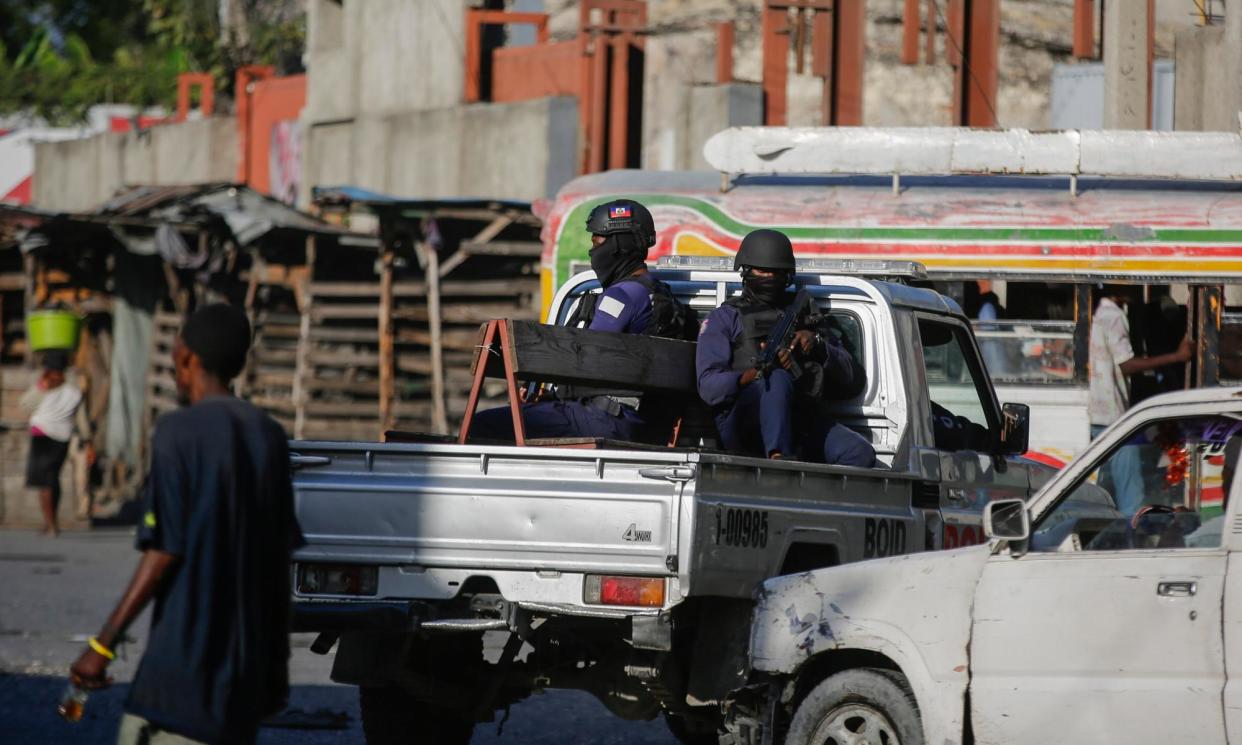Kenya high court rules against plan to deploy hundreds of police to Haiti

Kenya’s high court has ruled against a government plan to deploy hundreds of police to Haiti to lead a UN-backed multinational mission to fight escalating gang violence in the Caribbean country.
Enock Chacha Mwita, the judge who issued the ruling, said: “Any decision by any state organ or state officer to deploy police officers to Haiti … contravenes the constitution and the law and is therefore unconstitutional, illegal and invalid.”
The UN security council gave the go-ahead in early October for the Kenya-led mission, which has faced criticism at home and a legal challenge filed at the Nairobi high court in Nairobi last year by the opposition Thirdway Alliance.
Related: Kenya’s offer to send police to Haiti sparks human rights concerns
Constitutional lawyers and opposition parliamentarians had been critical of the way the government secured international approval for the mission before it obtained parliament’s backing.
The court’s ruling that the deployment was “illegal” did not turn on the major issues raised in the case, which lawyers said blind-sided both sides. The judge found that parliamentary approval was only required for military, and not police deployments, and that police could be deployed abroad.
It said, however, that for officers to be deployed, there needed to be a reciprocal arrangement with the host government, which the petitioners had argued – with no contest from the government – was not currently in place.
The judgment leaves the multinational mission in limbo and is also a setback for the Kenyan government, which had hoped to have police on the ground this month, and has said it will appeal.
On Thursday, Haiti’s foreign minister, Jean Victor Généus, pleaded for the deployment to be speeded up, telling the UN security council that violence in the country was as barbaric as in a war zone.
Haiti’s descent into chaos was sparked by the assassination of the country’s president, Jovenel Moïse, by Colombian mercenaries in July 2021, but gang violence and lawlessness in the Caribbean nation reached new, more desperate heights last year.
The number of people violently targeted by gangs surged by 122% in 2023, the UN’s special representative for Haiti, María Isabel Salvador, told the UN security council on Thursday as she emphasised the urgent need for foreign intervention. At least 4,789 people were killed and 2,490 were kidnapped, many having to sell their homes to make ransom payments to their captors.
The rampant violence and egregious human rights abuses now stretch far beyond the capital, Port-au-Prince, into the countryside, where a growing number of children are vulnerable to gang recruitment and women to sexual violence.
“I cannot over-stress the severity of the situation in Haiti, where multiple protracted crises have reached a critical point,” Salvador told the assembly in New York. New gangs continue to spring up across Haiti and a growing violent vigilante movement was also concerning observers, she added.
At least 350 people are estimated to have been killed by Bwa Kale – civilians who have taken up rifles and taken matters into their own hands as the police failed to protect them.
Haiti’s security forces are increasingly outgunned by the armed bandits who control most of Port-au-Prince. The national police have lost nearly 3,300 officers in the past three years, the force’s principal trade union said on Monday.
Almost nine in 10 of those officers were sacked for abandoning their posts, the Synapoha union’s general coordinator, Lionel Lazarre, said. Underpaid, and undertrained officers are running before they are killed by better paid and better-armed gang members, unions say.
The dwindling numbers of officers make
it even more important that the foreign taskforce is tactically astute and numerous, said Diego Da Rin, a Haiti expert at Crisis Group. “If the gangs see the international mission as weak and poorly trained they might want to forge a unified front to fight them,” Da Rin said.
Salvador cautioned that the mission would only be successful if Haitians themselves were involved in the process of rebuilding their country. “Long-term stability can only be achieved through a nationally owned and inclusive political process,” she said.
Given Haiti’s checkered record of foreign intervention – which includes sexual abuse by peacekeepers and the introduction of cholera into the country – several speakers told the UN that extra care must be taken to prevent history repeating itself.
The Kenyan deployment has faced pushback since it was proposed last year. Rights groups expressed concerns about the Kenyan police force’s poor human rights record, and observers questioned its suitability and preparedness to tackle security threats such as gun violence by sophisticated criminal gangs.
Kenya’s interests in leading the mission remain unclear. Observers have speculated that it is part of the current administration’s attempts to build the east African nation’s international profile, while others see its involvement as a proxy for its western ally, the US. Kenya also stands to make some financial gain from the mission, to which the US has pledged $100m (£79m) in intelligence, logistical and medical support.

 Yahoo News
Yahoo News 
